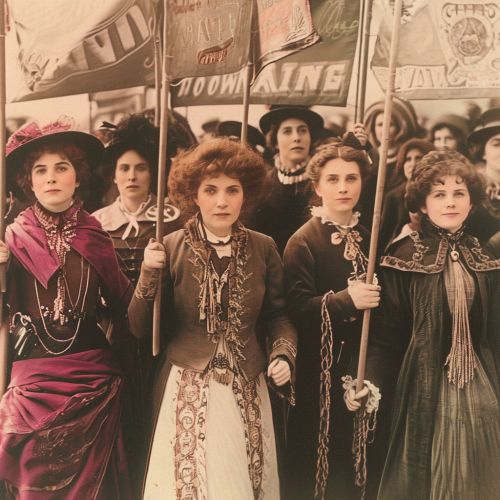Feminist movement
Origins
The feminist movement, also known as the women's liberation movement, has its roots in the 19th century with the women's suffrage movement. This early wave of feminism focused on achieving legal rights for women, particularly the right to vote read more. The suffrage movement was a global phenomenon, with women in different countries fighting for their rights and achieving them at different times.
First Wave Feminism
First wave feminism, which took place in the late 19th and early 20th centuries, was primarily concerned with women's right to vote. In the United States, this movement culminated in the 19th Amendment to the Constitution in 1920, which granted women the right to vote read more. In the United Kingdom, the Representation of the People Act 1918 granted voting rights to women over the age of 30 who met certain property qualifications read more.

Second Wave Feminism
Second wave feminism emerged in the 1960s and focused on a broader range of issues beyond suffrage, including sexuality, family, the workplace, reproductive rights, and legal inequalities. This wave of feminism was characterized by a series of political campaigns for reforms on issues such as reproductive rights, domestic violence, maternity leave, equal pay, women's suffrage, sexual harassment, and sexual violence. The phrase "the personal is political" was often used by second wave feminists to highlight the connections between personal experiences and larger social and political structures read more.
Third Wave Feminism
Third wave feminism, beginning in the 1990s, was a response to perceived failures of the second wave and a reflection of the more individualistic ethos of the time. It sought to challenge or avoid what it deemed the second wave's essentialist definitions of femininity, which often assumed a universal female identity and overemphasized experiences of upper-middle-class white women. A post-structuralist interpretation of gender and sexuality is central to third wave ideology. Third wave feminism also sought to challenge or avoid the "us versus them" mindset of the second wave read more.
Fourth Wave Feminism
Fourth wave feminism, starting around 2012, is associated with the use of social media and focuses on justice for women and opposition to sexual harassment and violence against women. Its essence is the intersectionality of race, gender, and sexuality. Issues that fourth wave feminists focus on include street and workplace harassment, campus sexual assault, and rape culture. Unlike previous waves, fourth wave feminism contains within it not a single feminist theory, but multiple feminisms, including intersectional, sex-positive, trans-inclusive feminism, and more read more.
Impact and Criticisms
The feminist movement has had a significant impact on society, securing voting rights for women, challenging gender norms, and opening up new opportunities for women in the workforce. However, it has also faced criticism, both from those who believe it has not gone far enough and from those who believe it has gone too far. Some critics argue that the feminist movement has focused too much on the issues facing white, middle-class women and has not done enough to address the concerns of women of color, working-class women, and women in the Global South read more.
